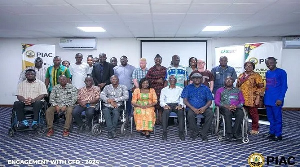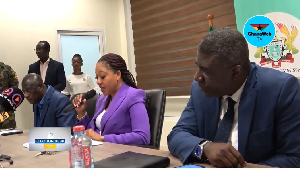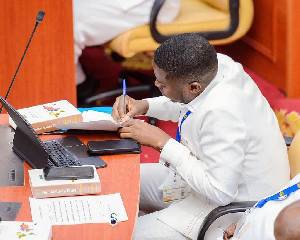The Ghana Federation of Disability Organisations (GFD) has expressed frustration over the exclusion of ‘Social Welfare’ from the list of priority areas funded by petroleum revenues, a trend persisting since 2011.
According to GFD members, the country’s efforts to create an inclusive society are being undermined by successive governments’ neglect in prioritising the needs of Persons with Disabilities (PWDs) under the Annual Budget Funding Amount (ABFA) as stipulated by law.
ABFA constitutes the main channel through which petroleum revenues are used to support the budget, per the Petroleum Revenue Management Act (PRMA) 2011 (Act 815) as amended.
The PRMA calls for ABFA allocations to be guided by a medium-term development strategy aligned with a long-term national development plan. But given the lack of a long-term national development plan, the PRMA mandates ABFA should give priority to – but not be necessarily limited to – programmes or activities relating to 12 areas.
These areas encompass a broad range of sectors, including agriculture, industry, education, health and social welfare, among others.
Despite these guidelines, government is instructed not to prioritise more than four areas when submitting a programme of activities for the use of petroleum revenue. These priority areas are also subject to review every three years after the initial prioritisation, with approval from parliament.
As of 2023, ABFA has cumulatively been allocated US$3.9billion, being 40 percent of total distribution from the Petroleum Holding Fund (PHF), according to the Public Interest and Accountability Committee (PIAC).
However, PWDs have only been featured once in this allocation – in 2012, when government allocated some GH¢10million to train a total of 5,000 PWDs in ICT, mobile phone and computer repairs and assembling under the Capacity Building priority.
It was against this backdrop that national president-GFD, Joseph Atsu Homadzi, emphasised the broader implications of neglecting Social Welfare as a priority area.
“If you are a nation and you don’t focus and make deliberate attempts to support vulnerable people, that nation will have a problem in its growth. Because the vulnerable people will become a liability to society, as they will be on the streets begging,” he stated.
Homadzi added: “The nation will grow when you provide and strengthen disability support so that PWDs can survive on their own while contributing their bit to national development.
“If you do this as a nation, then we can say this society is growing because it means you are carrying all your citizens along, whether they are vulnerable or not. But in a situation where you cut off the vulnerable people and only consider a few – with the majority becoming a liability, there is a problem.”
The GFD pesident was speaking in an interview on the sidelines of an engagement with PIAC, in Accra, and advocated for government and political parties to prioritise the Social Welfare sector. This, he noted, will go a long way to help vulnerable people become self-sufficient.
It is seen that the exclusion of social welfare from ABFA’s priority areas has consistently marginalised PWDs and hindered progress toward an inclusive society. This persistent oversight by successive administrations, some members of GFD opined, reflects a lack of political will to address the critical needs of PWDs.
A member of PIAC, Richard Ellimah representing Civil Society Organisations/Community-Based Organisations (CSOs/CBOs), said non-selection of the Social Welfare priority area that caters for the needs of PWDs is a matter of concern – “Because they are basically ignoring the needs of about 8 percent of our nation which is made up of PWDs”.
The meeting by PIAC with members of GFD was to present highlights from the 2023 PIAC Annual Report and explore collaborative options for promoting inclusive use of petroleum revenues for the benefit of all citizens.
The Coordinator of PIAC, Isaac Dwamena – explaining the rationale behind the engagement with PWDs, noted that the event is line with PIAC’s mandate to provide a platform for all citizens of the country to participate in debate on use of petroleum revenues.
He said while this is being done for the first time, it is fulfilling that PWDs are being involved and their voices recognised in decisions taken for the use of oil money.
A member of Ghana Burns Survivors Foundation (GBSF), Yaw Ofori Debrah, while commending PIAC for the engagement noted that going forward GFD and its members will deepen their advocacy for the Social Welfare priority area to be considered for selection by government.
Business News of Thursday, 18 July 2024
Source: thebftonline.com

















